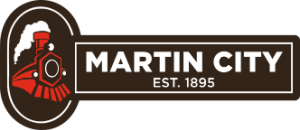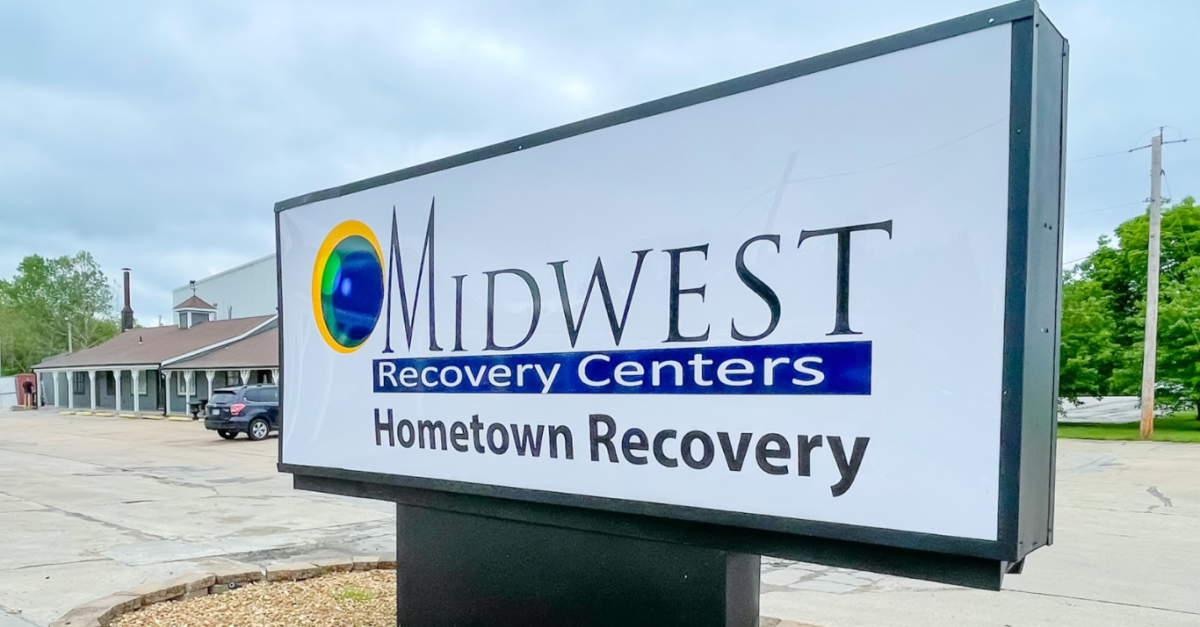Former Jack Stack Property Transformed into Detox and Residential Services Campus.
The old banquet halls at 136th and Holmes Road sat quietly for more than a year, but they’re coming alive again thanks to Midwest Recovery Centers. The Martin City company is repurposing the property for a mission far bigger than a barbecue dinner.
“These buildings are perfect for what we’re trying to do to help people across the area,” says Kevin O’Grady while touring the final phase of remodeling at the site between Reno’s Powersports KC and Mac N Seitz.
“We’re making a difference and creating something all of South Kansas City can be proud of.”

Midwest Recovery Centers new detox and residential campus at 136th & Holmes Road in Martin City.
Building a New Era Inside an Old Martin City Landmark.
Kevin O’Grady owns Midwest Recovery Centers along with partners Jeff Howard and Geffen Liberman. On the day we visited in late May, O’Grady and Liberman were nailing down details prior to officially opening their new detox and residential services facility. Contractors were hovering, water was about to come on, and electricity was just days away.
“Who would have ever guessed this would be turned into a healthcare facility,” says Liberman, gazing down a hallway that used to lead to wedding crowds and corporate parties. “We’ve come a long way.”
They certainly have. Midwest Recovery Centers started in 2016 with two buildings in Martin City near Fishtech and quickly expanded to include several houses for additional patient support. Now the business has expanded again, snatching up the old Jack Stack property down the street to help people in crisis needing urgent detox services in a setting that feels safe, secure, and comfortable.

Remodeling finishes up at the new MRC campus in Martin City, Missouri.

Martin City, Missouri Midwest Recovery Centers’ Expansion

Martin City, Missouri Midwest Recovery Centers’ Expansion
The property features two long buildings joined by a large parking lot near the shade of trees lining Martin City’s southeast edge. Each building is about 10,000 square feet and conveniently limited to one story. There are no stairs or elevators and none of the related risks or expenses. All the structural essentials are right where Midwest Recovery Centers needs them, and there’s already a strong sense of place here that seems to make it more than just another piece of real estate.

A familiar landmark turned healthcare facility at the MRC campus in Martin City, Missouri

Midwest Recovery Centers Martin City, Missouri

Midwest Recovery Centers Martin City, Missouri

Midwest Recovery Centers Martin City, Missouri
The north building is specifically residential, remodeled to accommodate ten private rooms housing 20 patients. There are also five bathrooms, a nursing station, and space for support staff. Each room is warm, inviting, and carefully configured. Liberman and O’Grady are clearly devoted to creating a feeling of welcoming and comfort.

Shaping home away from home inside residential rooms at the new MRC facility.

Liberman (left) and O’Grady check off their final to-do list inside the new MRC facility.

Bedrooms linked by a central hallway inside the residential building at MRCs’ new Martin City facility.
The south building didn’t need much remodeling. As a former banquet hall, the layout turns out to be rather ideal for group activities ranging from support meetings and special events to lounging, exercising, and dining. The existing kitchen is anything but ordinary. You can’t help but feel years of Jack Stack history lingering from the stainless steel to the tile floors.
“Isn’t this just great?” says Liberman, passing through the kitchen as we follow along behind him. “We have a big head start in establishing cafeteria service for our residents. Jack Stack certainly knew what they were doing when they put this in.”

The old Jack Stack catering kitchen ready for service again inside the MRC facility.
Televisions, ping-pong, foosball, exercise bikes, and oversized couches will fill the rest of the building — plenty of healthy options for patients in the early stages of recovery. O’Grady says the environment is also packaged in a way that welcomes the participation of the surrounding community.
“We want to be open to the community and make our space available. Even before officially accepting patients here, we’ve been hosting support meetings involving other community groups.”

Lots of room for social activities inside the new MRC facility.

A warm and welcoming atmosphere inside the new MRC facility.

Midwest Recovery Centers in Martin City, Missouri

Midwest Recovery Centers in Martin City, Missouri

Midwest Recovery Centers in Martin City, Missouri
Behind both buildings, to the east, is a large, empty lot full of possibilities. A gazebo is going up soon but there’s so much more potential. As O’Grady and Liberman look out across the lot, you can sense their excitement in shaping a vision. Maybe there will be an elaborate outdoor garden and meditation area. There’s also enough room for a volleyball court. Perhaps basketball too. And if they took down the back fence, who knows?
“There could be walking paths that wind their way through the woods,” says O’Grady, pointing toward the far side of the property. “We’ve got about an acre back here behind the buildings and you know the Blue River runs nearby, so maybe there are views that could be cultivated too.”

Kevin O’Grady imagines what’s next for the rear acre of the new MRC campus.
The great thing about the location of this detox facility is it’s unlike most others. Many are isolated far into the countryside. Others are right in the middle of busy urban areas. Midwest Recovery Centers has landed in the best of both worlds, not far from Martin City’s main drag but still removed enough for the therapeutic benefit of a natural setting.
Nostalgic markings top off the enduring hometown appeal of the property and elegantly reflect the company’s distinct “Hometown Recovery” brand. O’Grady says subtle salutes to the site’s barbecue past will remain intact, paying homage to the history of a familiar Martin City brand.
“Jack Stack really liked our mission and they were happy to hand off to a business like ours that’s focused on helping the community. You’d be surprised how much the heritage appeals to our patients and adds to the comfortable feeling we have here.”

Quiet echoes of Martin City’s culinary history welcome patients to a familiar place.

A new era begins beneath the old Jack Stack weather vanes.

Comforting nostalgia lingers in windows, doors, and benches.

A Martin City feeling from the inside out at the new MRC campus.
The Last Piece of a Business Plan Falls Into Place
The addition of the new campus completes Midwest Recovery Center’s plan to deliver a full spectrum of care. The business had developed effective outpatient and residential treatment programs, but didn’t have a way of immediately taking in people going through a severe addiction health crisis, referring them instead to hospital emergency rooms. Now those days are over.
“Now we can help even the most vulnerable patients,” says O’Grady. “We don’t have to turn them away, which is so important for long-term recovery. They don’t have to go to a hospital first and then come back to us. They’re with us the whole time, right from the start, working with the same people in the same environment. And that really increases their chances of full recovery. It’s critical.”
Patients in crisis who check into the new facility will typically need about a week to detox and a few more weeks to get back on their feet enough to depart the facility and continue treatment without needing to actually live there. Other patients will check-in for a while just for a healthy dose of motivation and confidence that comes easier in a residential setting where the support of others facing similar struggles is all around them.
“A full year is an important stretch of time for recovery,” explains O’Grady. “Remaining under our care for a year dramatically increases the chances of lasting success. We have our detox facility now, our outpatient programs and other support services, and our headquarters right down the street. It’s everything we need to deliver the care our business was created to deliver. It’s our vision realized.”

Midwest Recovery Centers headquarters further north at 13340 Holmes Road.
The company’s “Hometown Recovery” brand is unique in its focus on helping people recover in the same area where they live, rather than an alternate setting far away. Keeping recovery close to home is just what many people need as they continue their commitments to their families, friends, and jobs.
“People in residential treatment facilities are just like you and me. They’re good people in need of some help,” O’Grady emphasizes. “There’s an unfounded perception out there that recovering addicts are somehow prone to criminal activity and drive property values down. But that’s just not true. They are productive members of the community and their devotion to recovery makes them especially responsible.”
The detox facility itself also makes its corner of Martin City safer. There are security cameras everywhere, good lighting, and electronic access control at key entrances. Put it all together, from the nature of recovery patients to the design of the facility, and O’Grady says you’ve got an upstanding neighbor working hard for a healthy community.
“Facilities like ours can actually bring more stability to a neighborhood. People like us work very hard to maintain our property and keep it safe because it aligns with our effort to give our patients a healthy environment.”

Outside corridor at Midwest Recovery Centers
Martin City Welcomes a Good Move
You can expect hundreds if not thousands of visitors passing through Martin City every year as a result of the detox facility’s operation. More people means more money spent shopping and dining as well as more tax revenue to fund community improvements. In addition, Midwest Recovery Center’s staff has almost doubled over the past year to nearly 30 workers who help make the company’s economic impact on Martin City even bigger.
“We’re creating jobs and generating economic activity,” explains O’Grady, during a break from meetings with contractors in the parking lot. “We’ll have nurses working round the clock, a nurse practitioner and so many others. They’ll all be in a prime position to help fuel Martin City’s growth. We’re proud of that.”

A lengthy remodeling effort — just the beginning of economic activity generated by the new MRC campus.
Martin City seems to be proud of that potential, too. Businesses are reaching out with support and restaurants are going above and beyond to make Midwest Recovery Center’s new campus part of the Martin City family. O’Grady is already working with several to infuse the comforting flavors of our community.
“We’re figuring out a system of rotation for catering to our facility. We’re going over menus and timing, and it’s just going to be great. Martin City Brewing Company’s Coast-To-Coast Pub and others have already signed on. We love partnering with other businesses. It’s our nature to pull together and collaborate, and that’s how things work in Martin City. We’re so excited and we know we’re in exactly the right place.”
You certainly are, Kevin. We’re grateful for everything your business does for our Martin City community, and for all the people working to lead sober, healthier lives. Midwest Recovery Centers is a Martin City original and we’re proud of all they do to contribute to Kansas City’s growing healthcare industry. A diversity of businesses is key to Martin City’s renaissance, and we look forward to growing together.



